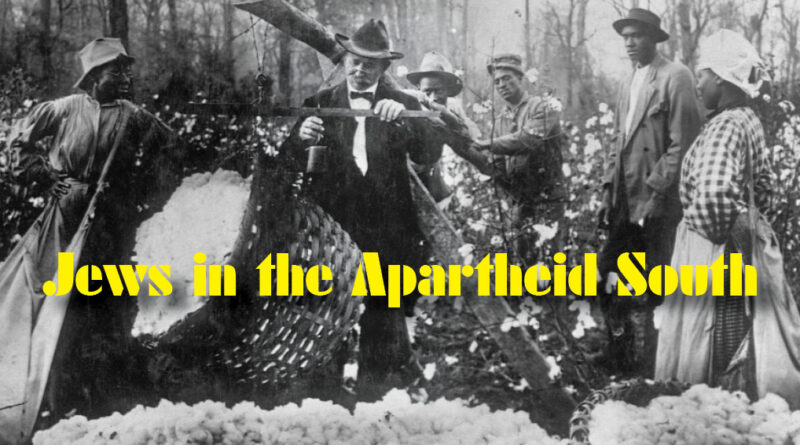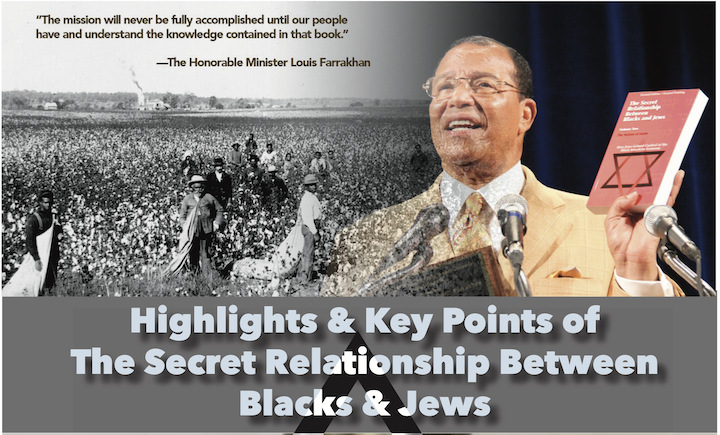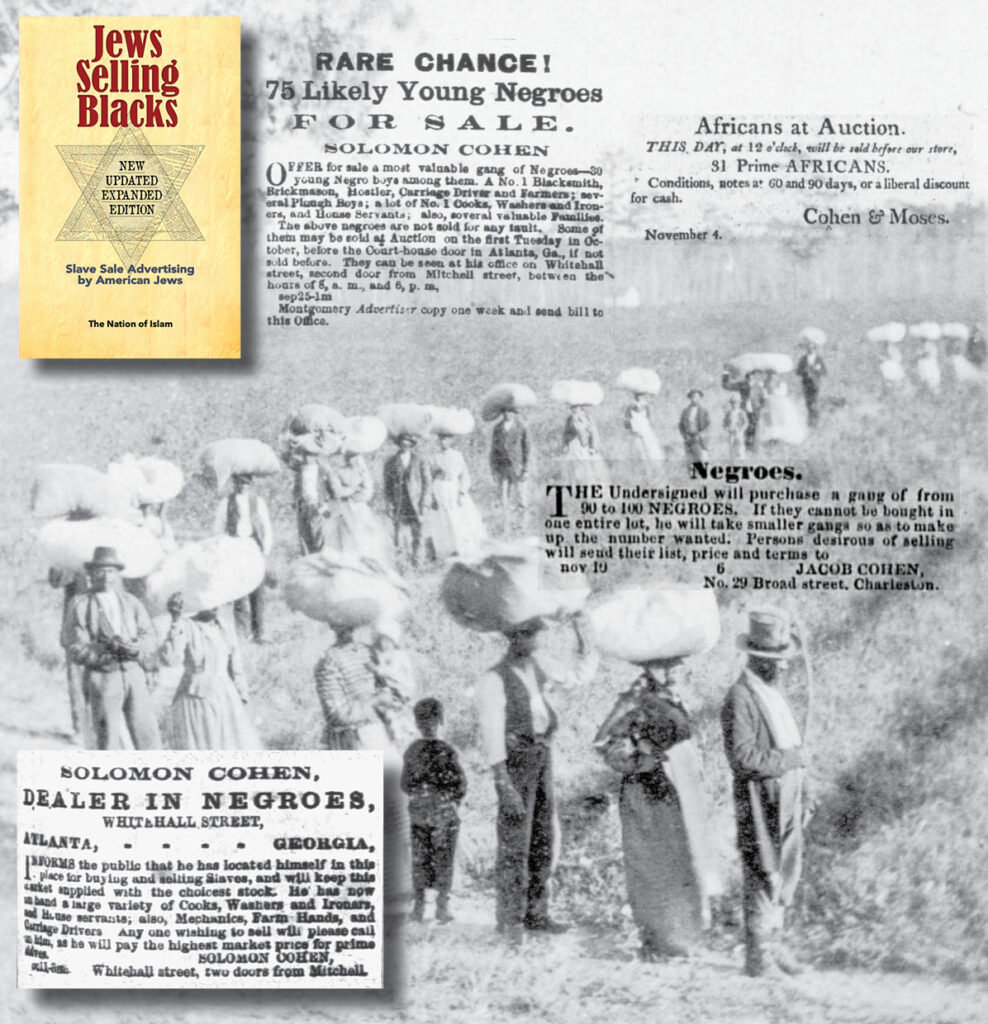Jews in the Apartheid South
An important myth about the position of Jews in the American South during the slavery and Jim Crow eras continues to heavily influence common perceptions about the role of Jews as victims of hatred and bigotry. Fundamental to the popular legend is the belief that Jews in the South were somehow outsiders in a peculiarly evil culture and thus more prone to be victimized by the swirl of regional race hatreds. Nearly every published handling of that history is framed by the presumption that the well-known anti-Black racism of the South also extended to Jews, but the history of the American South shows that the “atmosphere” for Jews in the apartheid South was not just attractive but especially welcoming and, most of all, extremely profitable.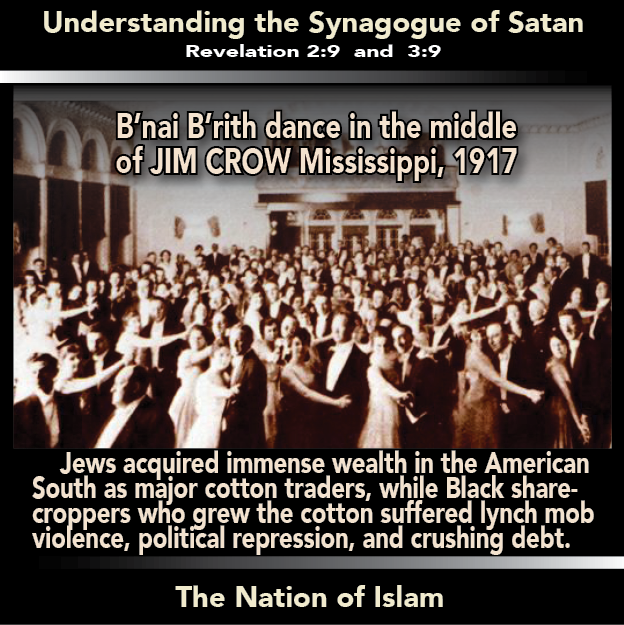
One of the most popular writers on twentieth-century Southern Jewry, Harry Golden, addressed a persistent theme about Southern Jewish history he was determined to debunk:
“The point I hope to establish…is that this ‘most Gentile’ section of America has provided the most favorable “atmosphere” the Jewish people have known in the modern world.”[1]
Golden was speaking specifically about the American South. The reverence that most bible belt evangelical Christians held for the “People of the Book” placed Jewish immigrants in an especially favored class. Their presence was even taken by many ignorant southern Gentiles as a sign of God’s sacred endorsement of their slave-based society. So Christians in the American South were time and again militantly protective of their Jewish population.[2]
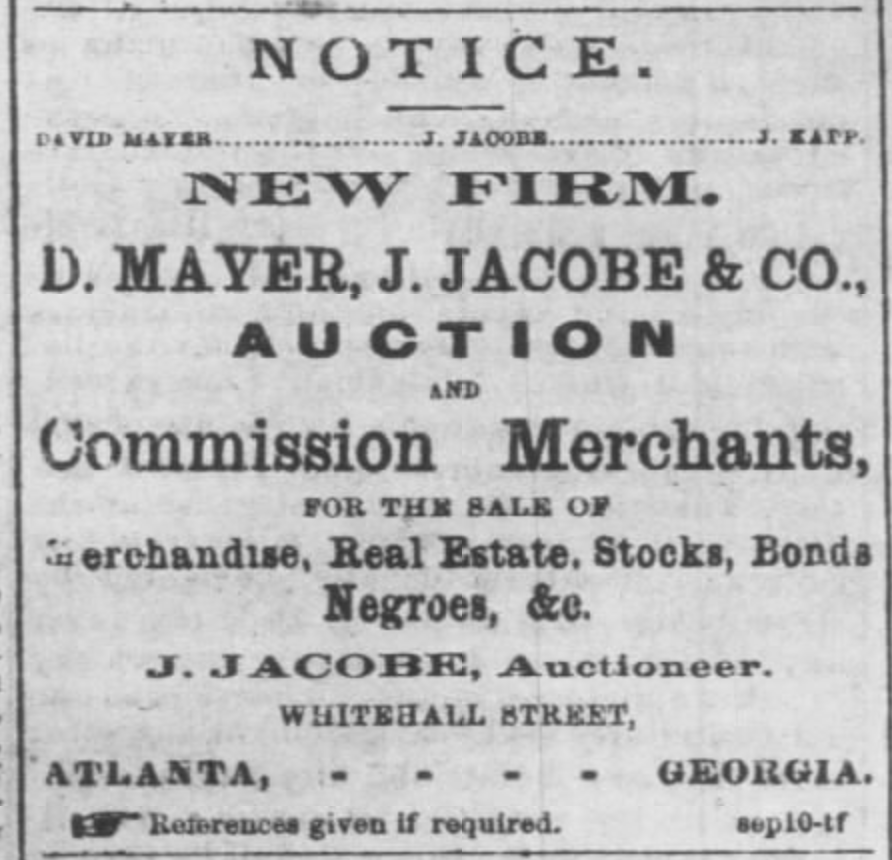
A century and a half before New York became the epicenter of Jewish American life, wealthy and cultured Jews thrived in the large elite community of Charleston, South Carolina. The city was both a major slave-trading center and the birthplace of Reform Judaism, the branch of religion with which most Jews identify today. It was also the home-base of multiple slave-trading Jews who had enthusiastically performed their sacred Southern duties as slave masters and slave dealers, and all had shared in the benefits of the African slave trade. The Jewish Encyclopedia made an astounding claim that put Jewish Americans at the heart of the slavocracy:
“[T]he cotton-plantations in many parts of the South were wholly in the hands of the Jews, and as a consequence slavery found its advocates among them.”[3]
In 1841, the slaveholding Charleston rabbi Gustavus Poznanski summed up the Southern Jewish American credo:
“This [Charleston] synagogue is our temple, this city our Jerusalem, this happy land our Palestine, and as our fathers defended with their lives that temple, that city, and that land, so will our sons defend this temple, this city, and this land.”[4]
After the Civil War Atlanta became the region’s new urban and industrial center, attracting enough of their faith to have the largest population of Jews of any city in the South. Jewish upward mobility was described by historian Albert Lindemann as “more striking in Atlanta than in most northern cities,”[5] and Jews routinely held positions of public trust in this ultra-Christian, militantly white supremacist region. At least twelve Jews held office in Jim Crow Atlanta between 1874 and 1911—considerable representation for a group that never exceeded three percent of the total population.[6]
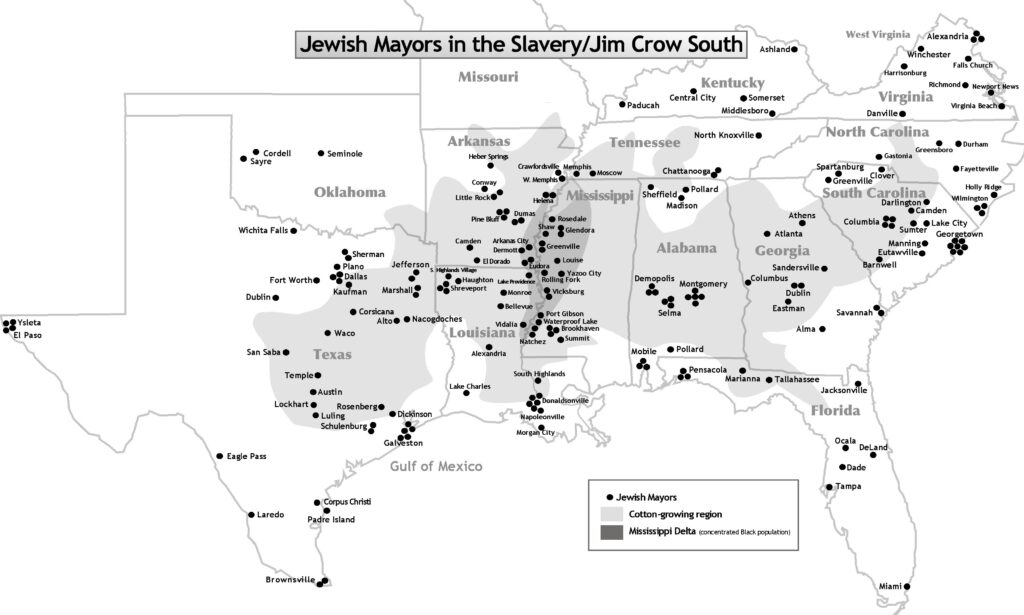
Scholar of Southern Jewry Dr. Mark K. Bauman maintains that of all the immigrant groups, the German Jewish community particularly “exerted power beyond its size so that it wielded considerable political influence and preferment.” Jews played a disproportionate role in the city’s economy, a high proportion being merchants, wholesalers, and tradesmen. According to one scholar:
“[Jewish] business leaders owned many of the largest commercial and manufacturing enterprises that provided employment for many local citizens…”[7]
Jews were partners in their own and Gentile law firms; they sat on grand juries; they served as bank founders, presidents, and officers; and they became officials in the chamber of commerce. “From 25 to over 35 percent” of Freemasons and many of the highest officers in the Masonic order were Jews.[8] Praise of Jews by their Gentile neighbors was effusive, as in this 1890 statement from an Alabama merchant extolling the “Hebrews of Atlanta,” in the pages of the Atlanta Constitution:
“[T]here is no one element in this city’s make-up more powerful than that. Look around you in any and every business, in every walk of life, and you will see that the leaders are the Hebrews. Everybody must admire the wonderful business capacity with which the race seems imbued, and everybody who makes any study of their home life will agree with me when I say that no people in the world are happier in their homes, none are better to their kinfolk, and none are better to the poor and needy….No religion has such well organized, such sensible and such beautiful charities…”
In that same year, a Jewish man surveying his own people’s accomplishments crowed:
“Here in Atlanta, they [Jews] are found in all walks of life, and they own, I suppose, between two [to] three million dollars’ worth of property. That is a conservative estimate.”[9]
The editor of the Atlanta-based Jewish South was bursting with justifiable optimism about the fortunes of Southern Jews when he wrote in 1878: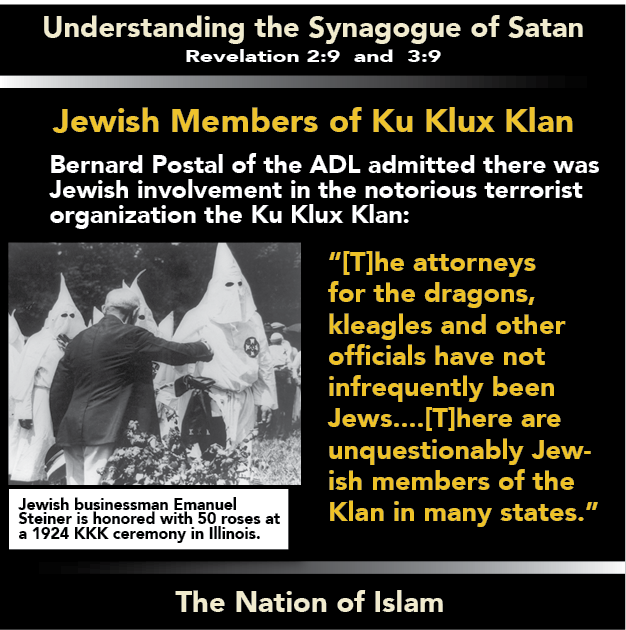
“[A]lthough [Judaism’s] growth in all sections of this land of the free has been most prosperous, still the South succeeded in producing the loftiest of fruits, of the greatest bounty and grandeur.[10]
“The Jews in Georgia, however, did more than merely become a part of the existing Georgia tradition. In many instances, they created, shaped, and influenced both the character and course of many of those traditions and institutions.”[Emphasis ours][11]
Jews embraced the race laws of America voluntarily and encouraged their Gentile neighbors to adhere to them unquestionably. It would take the Thirteenth Amendment, passed in 1865, to end American slavery legally, but a full thirty years later in 1896 the editors of the Jewish South newspaper opined, “Negroes are intellectually, morally, and physically an inferior race—a fact none can deny.”[14]
As lynching became the white national pastime the Jewish press turned on the most vulnerable and easy target. The Jewish Sentiment editor Frank Cohen cheer-led the lynchers and wrote in 1898:
“…The white man is not only superior to the black man but will assert his supremicy (sic) at the proper time and in the proper manner…”
It only improved for Jews as they moved into the 20th century. When the home of Jewish furniture magnate Oscar Pappenheimer burned down in May of 1914, the Atlanta police formed a cordon around the house to guard it overnight. It seems that Pappenheimer’s jewelry collection was one of the most valuable in the city. Destroyed were “the finest pipe organ in a private home in Atlanta,” three Stein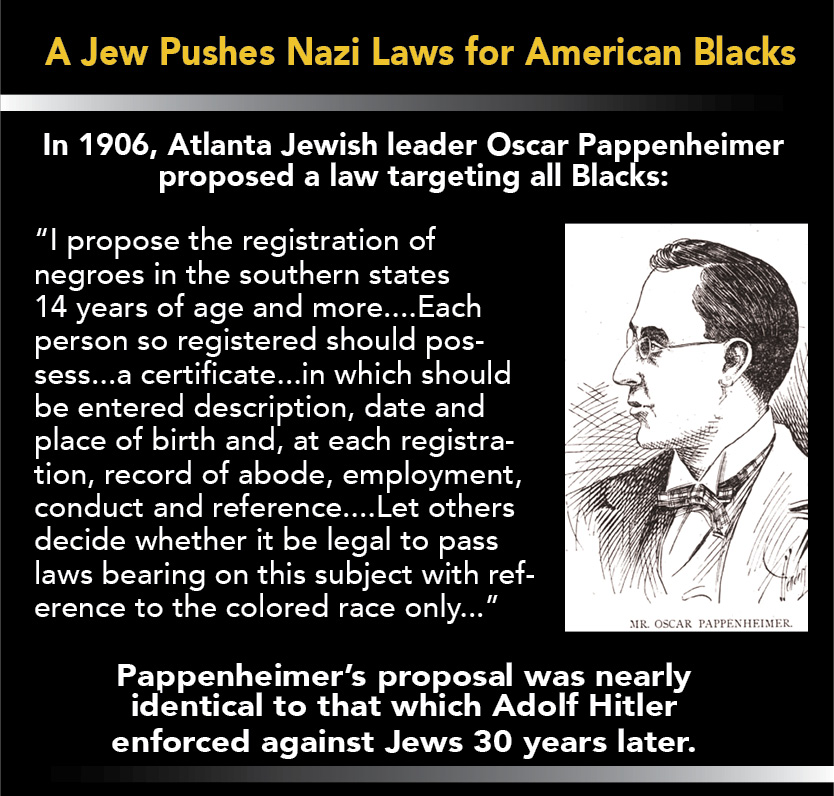 way pianos, and “prized violins and cellos.”[12]
way pianos, and “prized violins and cellos.”[12]
In 1906, that same Oscar Pappenheimer proposed a law targeting all Blacks: “I propose the registration of negroes in the southern states 14 years of age and more….Each person so registered should possess…a certificate…in which should be entered description, date and place of birth and, at each registration, record of abode, employment, conduct and reference….Let others decide whether it be legal to pass laws bearing on this subject with reference to the colored race only…” Pappenheimer’s Atlanta proposal was nearly identical to that which Adolf Hitler enforced against Jews in Nazi Germany 30 years later.
Jews reveled in their position as leaders among the many ethnic Europeans that settled the American South. No public position was denied to them, and the positions they attained found them eagerly swearing a solemn oath to uphold the sacred tenets of the apartheid legal system. They participated in the violence and terror that framed the slave system and stood elbow to elbow with all whites as slavery’s most ardent enforcers.[13]
It is true that the corrupt forces of historical revisionism have succeeded in burying this unsavory Jewish past, but all of these uncomfortable realities are well documented throughout the Jewish historical record. The Jewish role in the establishment and growth of apartheid societies goes even further back than Christopher Columbus and is much wider in scope than just the American South. It is a testament to the skill and reach of the Jewish myth-makers that so much race-hating Jewish history has been erased from the popular American consciousness.
FREE PDF DOWNLOAD: Highlights and Key Points of The Secret Relationship Between Blacks & Jews
[1] Harry L. Golden, Jewish Roots in the Carolinas: A Pattern of American Philo-Semitism (Greensboro, NC: Deal Printing, 1955), 6. He calls the Carolinas a “completely free society” and a “300-year-old ‘laboratory of philo-semitism.’”
[2] The Secret Relationship Between Blacks & Jews, vol. 2.
[3] Jewish Encyclopedia (1901), s.v. “agriculture.”
[4] David Philipson, The Reform Movement in Judaism (New York: Macmillan, 1907), 466-67.
[5] Albert S. Lindemann, The Jew Accused (Cambridge: Cambridge Univ. Press, 1993), 230.
[6] Steven Hertzberg, “The Jewish Community of Atlanta: From the End of the Civil War until the Eve of the Frank Case,” American Jewish Historical Quarterly 62, no. 3 (March 1973): 267.
[7] Steve Oney, And The Dead Shall Rise (New York: Pantheon Books, 2003), 7, writes that “many of Atlanta’s factories…were Jewish-owned.”
[8] Mark K. Bauman, “Jewish Community of Atlanta,” New Georgia Encyclopedia, March 15, 2004, http://www.georgiaencyclopedia.org: “Jews routinely held seats on the aldermanic board, the school board, and in the state legislature.”
[9] “Hebrews of Atlanta: The Important Part They Have Taken,” Atlanta Constitution, Jan. 12, 1890, 16.
[10] Jewish South, Feb. 8, 1878, and Nov. 7, 1879. Also, Abraham J. Peck, “That Other ‘Peculiar Institution’: Jews and Judaism in the Nineteenth Century South,” Modern Judaism 7, no. 1 (Feb. 1987): 101, 102.
[11] “A History of Jews in Georgia,” William Breman Jewish Heritage Museum, http://www.the
breman.org/research/stategeorgia.htm (retrieved April 9, 2009).
[12] “Pappenheimer Home Burned to Ground with $25,000 Loss,” Atlanta Journal, May 31, 1914, 1; Atlanta Constitution, May 31, 1914, 1.
[13] The Secret Relationship Between Blacks & Jews, vol. 2.
[14] Lindemann, The Jew Accused, 225.

